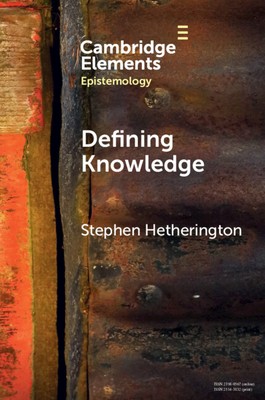
- We will send in 10–14 business days.
- Author: Stephen Hetherington
- Publisher: Cambridge University Press
- ISBN-10: 1009095137
- ISBN-13: 9781009095136
- Format: 15.2 x 22.9 x 0.4 cm, softcover
- Language: English
- SAVE -10% with code: EXTRA
Reviews
Description
Post-Gettier epistemology is increasingly modalized epistemology - proposing and debating modally explicable conditionals with suitably epistemic content (an approach initially inspired by Robert Nozick's 1981 account of knowledge), as needing to be added to 'true belief' in order to define or understand knowing's nature. This Element asks whether such modalized attempts - construed as responding to what the author calls Knowing's Further Features question (bequeathed to us by the Meno and the Theaetetus) - can succeed. The answer is that they cannot. Plato's and Aristotle's views on definition reinforce that result. Still, in appreciating this, we might gain insight into knowing's essence. We might find that knowledge is, essentially, nothing more than true belief.
EXTRA 10 % discount with code: EXTRA
The promotion ends in 20d.23:25:28
The discount code is valid when purchasing from 10 €. Discounts do not stack.
- Author: Stephen Hetherington
- Publisher: Cambridge University Press
- ISBN-10: 1009095137
- ISBN-13: 9781009095136
- Format: 15.2 x 22.9 x 0.4 cm, softcover
- Language: English English
Post-Gettier epistemology is increasingly modalized epistemology - proposing and debating modally explicable conditionals with suitably epistemic content (an approach initially inspired by Robert Nozick's 1981 account of knowledge), as needing to be added to 'true belief' in order to define or understand knowing's nature. This Element asks whether such modalized attempts - construed as responding to what the author calls Knowing's Further Features question (bequeathed to us by the Meno and the Theaetetus) - can succeed. The answer is that they cannot. Plato's and Aristotle's views on definition reinforce that result. Still, in appreciating this, we might gain insight into knowing's essence. We might find that knowledge is, essentially, nothing more than true belief.


Reviews